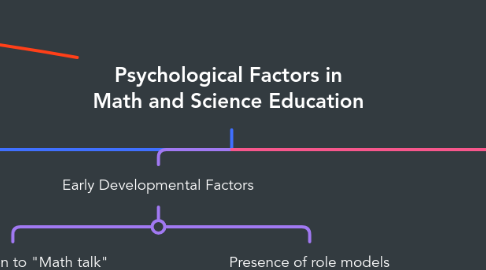
1. Social/Economic Factors
1.1. Gender Stereotypes
1.1.1. Gender stereotypes can negatively impact how students set future goals, and what they value in school. Female students are often discouraged from pursuing STEM fields; negative stereotypes often lead to a lack of participation and lower perceived levels of comprehension compared to when those stereotypes are not present. (Burke, 2007)
1.2. Ethnic/National Stereotypes
1.2.1. When stereotypes regarding race or nationality are present, students may develop avoidant tendencies towards those subjects out of fear of confirming/rejecting those stereotypes. (Steele & Aronson, 1995)
2. Early Developmental Factors
2.1. Introduction to "Math talk"
2.1.1. When children are introduced to math concepts from earlier ages, even in very rudimentary contexts, it becomes much easier for them to understand those same concepts later on. (Klibanoff et al., 2006)
2.2. Presence of role models
2.2.1. When children have stable role models who they perceive to be good at math, those children are more likely to view math favorably. The opposite can be said for children who have parents who vocalize that "math is hard"; this effect is ever more poignant amongst young girls who don't find active representation for women in STEM. (See attached)
3. Motivational Questions
3.1. "Can I do the task?"
3.1.1. As a metacognitive assessment, "Can I do the task?" is the most important question that students ask themselves before attempting an assignment. If students do not feel as though they can do a task, they are unlikely to try.
3.2. "Do I want to do the task?"
3.2.1. If students aren't able to see value in a task, they are unlikely to engage. Targeting individual students' motivation and getting them to see how a task relates to their personal lives/interests can address this issue.
3.3. Performance/Mastery Goals
3.3.1. *Performance Goals* provide extrinsic motivation to students by directly **relating success to specific outcomes:** getting an A, finishing 1st in your class, etc.
3.3.1.1. *Mastery Goals* provide intrinsic motivation to students by **relating success to personal understanding, knowledge, and development:** instead of aiming to get an A in Spanish class, they strive to become fluent in Spanish
3.3.1.1.1. Almost always, Mastery Goal Orientation leads to more sustained and persistent learning, and leads to increased engagement within classes. (Grant & Dweck, 2003)
4. Sources:
4.1. Burke, R. J. (2007). Women and minorities in STEM: A primer. *Women and minorities in science, technology, engineering and mathematics,* 3-27.
4.1.1. Grant, H., & Dweck, C. S. (2003). Clarifying achievement goals and their impact. *Journal of personality and social psychology,* 85(3), 541.
4.1.1.1. Klibanoff, R. S., Levine, S. C., Huttenlocher, J., Vasilyeva, M., & Hedges, L. V. (2006). Preschool children's mathematical knowledge: The effect of teacher "math talk.". *Developmental psychology,* 42(1), 59.
4.1.1.1.1. Steele, C. M., & Aronson, J. (1995). Stereotype threat and the intellectual test performance of African Americans. *Journal of personality and social psychology,* 69(5), 797.
